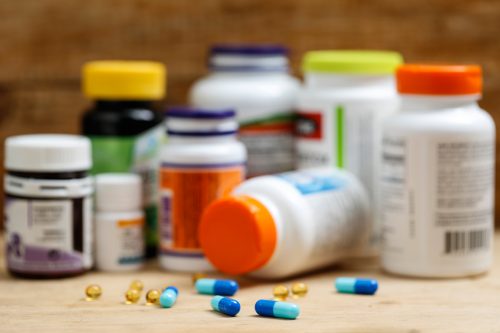
Between 2007 and 2016, 776 over-the-counter dietary supplements contained at least one pharmaceutical ingredient associated with an adverse warning from the U.S. Food and Drug Administration (FDA), according to a new study.
Researchers for JAMA used data from the FDA’s Center for Drug Evaluation and Research, Tainted Products Marketed as Dietary Supplements_CDER database from 2007 through 2016 to identify adulterated (containing unapproved ingredients) dietary supplements. They found the FDA had identified 776 adulterated dietary supplements (746 distinct products), implicating 146 different companies. In most cases (757 of 776 [97.6%]), these ingredients were not stated on the product label. Most of the products pertained to sexual enhancement (353 [45.5%]), weight loss (317 [40.9%]), or muscle building (92 [11.9%]); 157 (20.2%) of adulterated products contained two or more unapproved ingredients. The most common adulterants in these categories were: for sexual enhancement supplements, sildenafil (166 of 353 [47.0%]); for weight loss supplements, sibutramine (269 of 317 [84.9%]); and for muscle-building supplements, synthetic steroids or steroid-like ingredients (82 of 92 [89.1%]).
The FDA had no involvement in the study, the researchers noted.
Most of the adulterated supplements remain available to the public, Dr. Pieter Cohen stated in an accompanying editorial.
“Despite their limited effectiveness, voluntary recalls are the most common approach used by the FDA to remove adulterated supplements from commerce,” Cohen wrote. “In the current study, the agency discovered 746 distinct supplements to be adulterated but announced voluntary recalls for only 360. Only 360 of 746 (48%) were recalled, leaving the majority of adulterated supplements, more than 350 products, available for sale.”
More than half of U.S. adults report using a dietary supplement, the study authors note.
The researchers concluded, “These products have the potential to cause severe adverse health effects owing to accidental misuse, overuse, or interaction with other medications, underlying health conditions, or other drugs within the same dietary supplement. As the dietary supplement industry continues to grow in the United States, it is essential to further address this significant public health issue.”
In his editorial, Cohen called for congressional reform, suggesting the reform the Dietary Supplement Health and Education Act of 1994 be updated.
“In the meantime, the process that the FDA is required to follow to remove supplements from the marketplace will remain cumbersome and time-consuming; nevertheless, the agency’s failure to aggressively use all available tools to remove pharmaceutically adulterated supplements from commerce leaves consumers’ health at risk,” he wrote.
Fish Oil Pills Have Little to No Effect on Cardiovascular Health
ASCEND: Omega-3 Fatty Acid Supplements Do Not Prevent Serious Vascular Events in Diabetics
Study: Vitamin D Supplements Do Not Affect Bone Health
What a shock!! Researchers found unapproved and sometimes dangerous drugs in 746 dietary supplements, almost all of them marketed for sexual enhancement, weight loss or muscle growth.” https://t.co/O9XU1GTNXO @TrueHealthDiag
— Thomas Dayspring (@Drlipid) October 15, 2018
When you get history from your patients always ask about food supplements. @US_FDA – Potentially harmful pharmaceuticals can be found in many over-the-counter dietary supplements” #NotHarmless https://t.co/hfgs1LSPGM pic.twitter.com/QqkJJ3n0Jc
— Naftali Kaminski (@KaminskiMed) October 15, 2018
Unapproved pharmaceutical ingredients found in nearly 800 over-the-counter dietary supplements, commonly products for sexual enhancement, weight loss, or muscle building; FDA needs to do more and stop relying on voluntary recalls by fraudulent companies https://t.co/0SwadfgZVx
— Joseph Ross (@jsross119) October 13, 2018
According to the FDA, 750 different adulterated supplements for weight loss, male sexual enhancement, & muscle building, spanning 9 years were found to be laced with corresponding drugs (viagra, sibutramine, etc). This is insane. #supplements #nutritionhttps://t.co/LxbhLOOtqB
— Justin Groode (@DrJustinGroode) October 15, 2018
Did you know that the FDA does not regulate supplements as it does with prescription & OTC medications? Ask your #pharmacist before choosing and using a supplement. #APhM2018
— Deanna Tran (she/her) (@DeannaTranPharm) October 15, 2018
Sources: JAMA: The FDA and Adulterated Supplements—Dereliction of Duty; Unapproved Pharmaceutical Ingredients Included in Dietary Supplements Associated With US Food and Drug Administration Warnings






 © 2025 Mashup Media, LLC, a Formedics Property. All Rights Reserved.
© 2025 Mashup Media, LLC, a Formedics Property. All Rights Reserved.